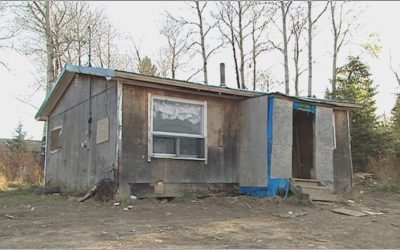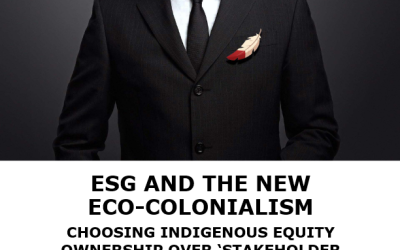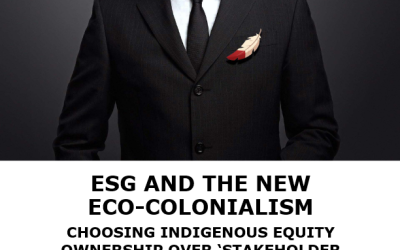Allan Duff and Henare O’Keefe traveled from Vancouver to Halifax in May and the two Maori men made several stops along the way. The trip was sponsored by the Winnipeg based Frontier Centre for Public Policy (FCPP).
Duff continually bashed away at the Maori leadership during the tour. And you don’t have to be a tea leaf reader to figure out that the Frontier Centre folks expect Canadian audiences to connect at least some of those criticisms to Canada’s First Nation leaders. It’s a familiar device: Aboriginal people can say critical things about Aboriginal leaders that political correctness might prevent non-Aboriginal people from saying.
Perhaps coincidental to the rise of the right leaning Conservative Party of Canada, perhaps not, more Aboriginal voices are being heard publicly saying things that right-wingers have muttered amongst themselves for a long time. Many Aboriginal people have been critical of the status quo: Osoyoos Indian Band Chief Clarence Louie, Haida lawyer-turned-author Calvin Helin, the Frontier Centre’s own Don Sandberg from Norway House in Manitoba, Kahnawake Mohawk University of Victoria Indigenous governance professor Taiaiake Alfred, to name a few.
While some First Nation commentators often criticize their leaders for having too cozy a relationship with Canadian governments, others seem to think First Nations aren’t cozy enough with with the mainstream society. Either way the leaders are targets for criticism. Duff and O’Keefe think they’ve earned it.
Duff, New Zealand’s best selling author, broke through in 1990 with Once Were Warriors, a tough, violent look at the social problems in Maori communities. Four years later the book became a critically acclaimed movie.
His parents separated when he was 10 years old and he lived with relatives and got into trouble with the law. He has acknowledged that the book is based on his life experiences.
During an interview at the University of Calgary on May 1, Duff and his partner Henare O’Keefe said their main mission was to talk about a project they started in New Zealand 13 years ago.
“We’re here to talk about the literacy program that I founded, called Books in Homes. It’s put millions of books into the homes and ownership of children from disadvantaged backgrounds,” Duff said.
He said he decided to start Books in Homes on his own because he did not see the Maori leadership focusing on getting young Maori people educated as a way of solving the social problems they face.
“What makes our program so unique is that we’ve got a mix of private and government funding, no trustee gets a cent, and any surplus monies go to a capital reserve and we use the interest for scholarships and awards and all sorts of things. It’s not about us as individuals. It’s not about our glorification, our money, our perks, our pensions. It’s about the children and only the children,” Duff said.
He collects no salary for his work with the program.
“No. Nothing. I might get a cup of coffee and that’s about all,” he said. “I’ve nearly gone bankrupt trying to get the thing going but . . . no, no, it’s worked well and I’m glad there’s no salary. It keeps the whole spirit and integrity alive.”
Calgary was only the second stop on the tour, but Duff was already hearing that the things he criticizes about the Maori leadership are things Indigenous people complain about here.
“In the first interview we had I was loath to make any comparison. I know there’s lots of similarities. I know there’s a lot of this government dependency on funding. I know there’s a lot of myths being rammed down people’s throats that somehow this so-called condition of poverty afflicts Indigenous people more than any other people, almost as if it’s a government conspiracy,” he said.
That’s not to say that Maori people weren’t the victims of injustice, he added.
“There have been great acts of injustice, land confiscation, no question about that. But successive governments have bent over backwards to remedy that. And those tribes have since gone on to use that money, mostly, to very good effect,” he said.
But despite that, he can’t say his people are in a good situation.
“We dominate the crime stats and have poor health and unemployment. It would appear to me that it’s very much the same here,” he said. “What I’ve been trying to advocate is that ultimately the only solution is a sense of individuality. A collective never achieves anything because you can hide in the collective.”
First Nation chiefs insist on collective rights. They say their traditional way of living placed the communities interests above the individual, that the western concept of individual rights is not their way and any attempt to force them into step with the mainstream would be an attempt at assimilation, a form of cultural genocide.
“Of course they do because they can control it, and fancy being proud of receiving all this government aid? It’s a disgraceful thing,” he said.
Duff said his literacy program is proof that progress can be made if the focus is on trying to solve problems rather than putting all your effort into political matters like self-government and collective rights. His point of view would not be out of place at any right wing political meeting.
“It starts with a single step. When we got started I went to government and said, ‘I’ve got a scheme’ and I asked them for $5 million. The politician gave me a personal cheque for $500. It didn’t even cover our airfares. But now we’ve got 100,000 children on the program and we’ve got another 20 odd thousand on the program in Australia and three schools in America and it would be neat to think that we could get it going here,” he said. “But I always stayed wide of the official Maori government sanctioned organizations. I knew that they were all bureaucrats and bureaucrats don’t get things done. Governments by definition can’t get things done. That’s why they join governments, because if they were in business they wouldn’t last a week with their practices and their ill disciplines and with the whole understanding — or misunderstanding — of capitalism, they wouldn’t last.”
He believes the fact that his private sector business approach has been successful underlines just how ineffective the bureaucratic approach has been.
“I think we’ve shown up the Maori leadership for being totally without vision and without any self-impetus. They’re only interested in the ceremonial things or dollars. Every dollar has to go past their ticket clipper. And it goes by their family members and they clip the ticket and then by the time it gets to the people there are no more rides left on the bus,” he said.
He said the social problems in Aboriginal communities are caused by the lack of individual rights and the individual sense of responsibility that he believes go with individual rights. Housing is a prime example, he argued.
“If the collective owns it, what incentive have you got? If it’s yours and you can trade it and then the value increases because there’s big demand and you’ve improved it, you can say, ‘I want to buy that nice four-wheel drive vehicle or something, then private property enables you to do that,” he said. “And if you own the property you’re not going to let people trash it because they’re all drinking, getting drunk and kicking holes in the wall. You’re going to say, ‘Hey, this is my property. Get the hell out of here. Take your drinking off somewhere else.’ There’ll always be that percentage, there’s a low caste in every society – white, brown, yellow, black. I don’t know what percentage it is but there’s a hardcore five per cent that just can’t be saved. And I wouldn’t even try to save them. You could give them all a cheque for a million, give them a cheque for $5 million and it’ll be gone in a year.”
Uneducated people living on welfare are bound to be miserable, he said.
“I think we’ve also got to remember they’re spiritually poor, they’re morally poor, they’re emotionally poor. Literacy-wise, they are bereft. So they don’t have any of the equipment, any of the tools that are required to have even half a satisfying life, especially in this modern society. In the old society they would have just been put to work on the Great Wall of China or whatever and they wouldn’t even have had a voice. But now they’ve got a voice and all these liberals come out and if they want to give away taxpayers’ money to all these different, sort of, losers well let them go ahead,” he said. “I’m saying it’s an insult to life when you want to do special favors to people because they’re Indigenous.”
If you’ve been treated poorly, he suggested, don’t get mad, get even.
“The Chinese in particular, in our country they suffered awful oppression. If you happened to be a New Zealander of Chinese extraction you had to pay a special tax just simply because you existed as a Chinaman. And of course it was 100 pounds back in the late 1800s when 100 pounds was two years’ salary. What did they do? They quietly put their heads down, they paid it, they gathered up amongst themselves and they quietly started buying up the main streets of every town that they ever lived in and they became the landlords. That’s how you do it. Not by whining,” he said.
The system has failed Maori people, he argued, and those in it should be held accountable for the bad results no matter whose feelings are hurt.
“Our societal model just does not work. Political correctness is actually an evil in itself because it’s there for the sake of the white liberals,” he said.
When grassroots people complain that their chiefs are taking everything for themselves, they should be listened to, he added.
“It is the case. Universally it has always been the case throughout history. In the old Britain, the aristocrats took it all for themselves. In the old America, the robber barons took it all for themselves. It is human nature,” he said.
O’Keefe is a Christian who brings an evangelical energy to his speaking engagements. He preaches love and family values as the answer to gang violence and other social problems faced by young Aboriginal people. He has been a foster parent to more than 200 children. Although he doesn’t have the abrasiveness of his good friend and partner, he shares many of Duff’s opinions.
“I’m very disappointed with current leadership. If I can get a little evangelical about it: they’ve forgotten how to serve. I truly mean serve, without expectation. They start off ok but then they turn into celebrities,” O’Keefe said. “There’s a lack of suffering, in our country, that has the inclination to bring out the kind of leadership that you’re looking for like Nelson Mandela, Gandhi. Those men have sweat blood for their people. They have put their lives on hold and deprived themselves. Nelson Mandela went to jail for his people. The people would say, ‘I love Nelson Mandela.’ There’s not one leader in our country we would say that about. We don’t trust them; we don’t revere them.” Duff agreed.
“We’ve got to have more of that giving back because right now everybody’s taking for themselves. Years ago, a public servant was not a bureaucrat who was saying how much is my pension going to be and I want to travel business class and that sort of thing. He or she said, ‘How can I serve my country?’ They were proud to be a public servant. Not now,” he said.
Congress of Aboriginal Peoples leader Patrick Brazeau caused a stir in Canada more than a year ago when he backed the Conservative Party of Canada in the federal election and then said there are “too many chiefs.” Windspeaker asked Brazeau what he thought about Duff’s comments. He pointed out that he was not familiar with Duff’s work but he agreed that more and more Aboriginal people are speaking up against the chiefs.
“I do believe a ‘movement’ has started with respect to the issues of accountability, Indian Act reform and the issue of self-responsibility, as it applies to Aboriginal people and issues,” he said during a phone interview on May 13. “Because of the current system that we have in place, the ‘too many chiefs and not enough Indians’ thing, there’s this law in Native country and that is to not speak out against the potential mismanagement and fraud that’s occurring and the control and abuse of power by the Aboriginal leadership in the country.”
He agreed when told that Duff and O’Keefe had said that the current bureaucratic system of governance prevents the emergence of leaders like Mandela.
“It’s a fair assessment of what the landscape is in this country, again because of the fact that there’s too many leaders serving not enough people. As long as that system remains intact then nothing’s going to change. And when you have more than 600 leaders fighting for the same dollars, money will create problems in terms of jealousy and power and entitlements,” he said. “I think in this country we’re starting to see more and more young leaders who are more business minded and becoming more educated and I think this is the reason why we’re seeing so many leaders speak out against what the problems are. And the problem is not more money, the problem is the current leadership.”



